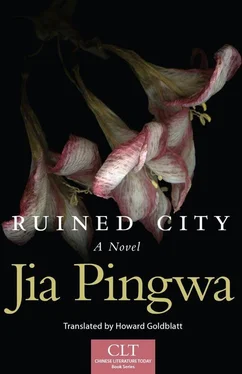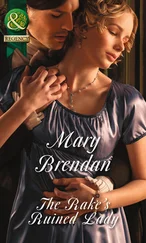After Niu Yueqing left, Zhuang said, “In public I’m surrounded by admiring people, but here at home this is what I get.”
“She’s not so bad,” Zhao said. “She’s not terribly well educated, but you don’t find many women that virtuous.”
“When she loses her temper,” Zhuang said, “she could give a rock a headache. But if she likes you, she’ll stuff you with food even after you’re full.” Telling Zhao to stay put, Zhuang took the brick to the Literary Federation compound on his scooter.
When he returned, before he had even taken a sip of tea, Niu Yueqing came in and called her mother out for one of the still-warm stuffed buns she had bought. Her face glowed. “Guess what happened,” she announced.
“Back so soon?” Zhao said. “I’d say they wouldn’t take it back.”
“They took it back!”
“See, you did it. You have to be tough to get by in the world,” Zhao said.
“Not true,” Niu Yueqing corrected him. “I went up to the counter, and when the clerk asked me what I was in the market for, I just stammered, couldn’t say a word. She laughed and asked me if I was returning a purchase. I said yes. She took it, handed me my refund, and that was it.”
“That was it?” Zhao asked, clearly surprised.
“That’s what I’m saying. It couldn’t have been easier. A bit of a letdown, actually.”
No one spoke for a few minutes. “We often try to make complex matters simple,” Zhuang said to break the ice. “But we also frequently do the opposite.”
Niu Yueqing curled her lip. “Another object lesson from our writer.”
The old lady complained about the blandness of the stuffed bun, so she took it back to her room to add some vinegar from a large vat. When she removed the cloth cover, the aroma flooded the room.
“What’s that smell?” Zhao asked. “It’s very strong.”
“Did you stir the vinegar, Mother?” Niu Yueqing shouted. It had to be stirred with a clean paddle daily.
“No need,” she replied, “it’s ready.”
“You make your own vinegar?” Zhao said.
“Your Zhuang Laoshi won’t even taste the smoky vinegar they sell on the street. Nothing but white vinegar. So I made a vat of my own. It has a wonderful flavor, absolutely pure. I’ll send you home with some.”
“I’m not as picky as Zhuang Laoshi,” he said. “I’ll eat anything. But if you have pickled vegetables, I’ll drop by someday to try them.”
“You came to the right place,” she said. “We have pickled cabbage, salted vegetables, pickled sweet garlic and chili peppers, whatever you like.” At that, she fetched a plastic bag, filled it with a little bit of everything, and handed it to Zhao to take home.
Zhuang was talking about how they preferred the kind of food villagers eat when he was reminded of the shoes. He took them out of the scooter basket and handed them to Niu Yueqing.
“You bought these for me?” she said.
Zhuang did not tell her that Ruan Zhifei had given them to him. She did not like Ruan, thought he was a thug. So he told her that Xia Jie had given them to him the day before at Meng Yunfang’s home.
“My goodness!” she said when she examined the black leather shoes with stiletto heels. “These aren’t shoes, they’re instruments of torture.”
“I hate it when you talk like that,” Zhuang said. “If they’re instruments of torture, then why are all the women out on the street wearing them?”
Niu Yueqing took off her shoes and tried on the new ones. “You’re always hoping I’ll turn fashionable. Well, with these shoes, I won’t be able to do a thing around the house. Are you willing to wait on me?” She stood up and complained of pain caused by the bulge in front. Born with wide, fleshy feet, she wore only flats, which drew a sigh from Zhuang Zhidie, who said that feet are a woman’s most important feature. With unattractive feet, she loses three-tenths of her beauty. With a frown, Niu Yueqing said, “If I’m going to wear high heels, they have to be made in Beijing. I can’t wear shoes made in Shanghai.” Zhuang had no choice but to take the shoes back. Gratitude was one thing he did not want. He left with Zhao Jingwu, hanging the shoebox on his handlebars.
. . .
Zhao took advantage of Zhuang’s good mood to tell him about an entrepreneur named Huang who had opened a pesticide plant in Shilipu on the south side of town and had come looking for him three times, insisting that Zhuang write an article about the plant. Length was no problem, and he could write what he wanted, so long as it was published. “How much did you get?” Zhuang asked Zhao with a laugh. “You let me pull up the stake so you can steal the cow.”
“Oh, please,” Zhao said. “I won’t lie to you — he’s a relative of my aunt. She came to me about this, but I put her off. But he won’t stop hounding me. I see no reason for you to say no. You could knock something like that out by skipping one round of mahjong. I got him to agree to pay you five thousand yuan.”
“I’ll use a pen name,” Zhuang said.
“No, you can’t,” Zhao replied. “It’s your name he’s paying for.”
“My name is worth five thousand yuan?”
“You’re a man of good character, and, unfortunately, these days that equals poverty. Five thousand is nothing to sneer at. You wouldn’t get much more than that by writing a whole novel.”
“I’ll think it over.”
“He’s coming to my place today, so make up your mind now. Don’t mention the money. I want him to pay up front. These people are rolling in the stuff.”
They arrived at Zhao Jingwu’s home, where a popcorn peddler had a fire going in his stove, sending smoke into the air in front of the gate. Zhao kicked the stove. “Are you trying to suffocate us? Can’t you go somewhere else?” The soot-covered peddler rolled his eyes and was about to stand up to Zhao, but after he took a couple of steps, he swallowed hard and moved his stove away.
After the smoke cleared, Zhuang took a look at the address: 37 Sifu Road. The fancy arched gateway had decorative tiles and spiny glass ridges. Stone blocks carved with scenes and figures topped the towers. A detached protective guard on the frame, peeling black paint on the doors, and six missing metal fasteners marred the gateway. A pair of unicorns in relief decorated the high bluestone gate pier. Iron rings were inlaid in the outer walls, which were fronted by long purple stones. Seeing how intently Zhuang was looking everything over, Zhao told him that the rings were for tethering horses, while the long purple stones were known as mounting stones. In earlier days, rich families rode horses down the street; bells fastened to the reins rang out, and the hoof beats pounded rhythmically. It was a more impressive sight than officials riding by in cars these days. The carving on the gate pier particularly impressed Zhuang, who said that the residents of Xijing had excavated and restored just about everything else, but no one had paid any attention to the pier gate carvings. If he went around making stone pier rubbings, he could publish a book of them. He walked in through the gate and up to a screen wall that blocked the view from outside. The relief design was one of Zheng Banqiao’s single-stalk bamboo paintings between a pair of scrolls that read
A stalk of green bamboo braves the storm
Like a brush that paints clouds in the sky
“This is the first time I’ve seen one of Zheng’s single-stalk bamboo paintings,” Zhuang said, clapping happily. “Why don’t you make a rubbing of it?”
“They’re going to demolish the house,” Zhao told him, “and take this down. If you like it so much, why don’t you preserve it?”
“The poem isn’t bad,” Zhuang replied, “but being carved into a gate screen gives it a bit of a bleak quality.”
Читать дальше


![Matthew Vincent - [you] Ruined It for Everyone!](/books/216429/matthew-vincent-you-ruined-it-for-everyone-thumb.webp)









